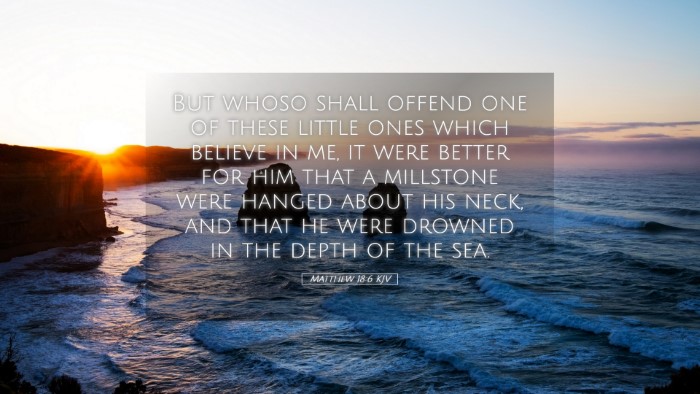Commentary on Matthew 18:6
Verse: "But whoso shall offend one of these little ones which believe in me, it were better for him that a millstone were hanged about his neck, and that he were drowned in the depth of the sea."
Contextual Background
This verse forms part of Jesus' teaching on humility and the serious nature of causing others to stumble in their faith. It follows the disciples' query about who is the greatest in the kingdom of heaven, leading to Jesus placing a child among them as an example of humility and faith (Matthew 18:1-5). The inserted warning in verse 6 emphasizes the severe consequences of leading the innocent astray.
Interpretation of 'Offend'
The term "offend" in this context translates to causing someone to stumble or fall into sin. Commentators like Albert Barnes expound that this is a serious spiritual offense, particularly relevant to those who might abuse their influence over the innocent or young in faith. Matthew Henry remarks that offending a child, both literally and figuratively, holds a heavy weight, as it signifies acting against the tender and pure-hearted.
Significance of 'Little Ones'
The "little ones" refers not only to children but also to believers who, in their faith, exhibit a childlike trust. Adam Clarke emphasizes that Jesus highlights their importance, suggesting that these individuals are precious in the sight of God. Therefore, the warning serves as a reminder to nurture and protect the faith of those who are vulnerable and impressionable.
The Millstone Imagery
The imagery of a millstone signifies a weighty and inescapable punishment. Matthew Henry notes that it reflects the gravity of leading a believer astray, indicating that such actions incur divine judgment. The suggestion of being drowned in the sea evokes a sense of total destruction; Adam Clarke elaborates that this expresses the severity of the fate awaiting those who violate the sanctity of faith among believers.
Theological Implications
This verse has profound theological implications concerning accountability. Albert Barnes interprets it as a call for vigilance among leaders, teachers, and anyone in a position of influence. It warns them about the eternal consequences of their actions, especially the detrimental impact they have on the faith journey of the less mature or weaker believers.
Practical Applications
- Vigilance in Teaching: Leaders must be aware of the responsibility they carry in guiding others. Their teachings must uphold the truth and encourage sound doctrine.
- Protection of the Vulnerable: There should be a proactive approach in safeguarding the faith of those who are young or fragile in their belief.
- Self-Examination: Individuals should examine their own lives, ensuring their actions do not lead others away from Christ.
Concluding Thoughts
In summary, Matthew 18:6 serves as a stern reminder of the responsibilities we bear in our faith communities. The gravity of leading the innocent astray necessitates a heartfelt commitment to humility, protection, and genuine care for all believers. As Matthew Henry reflects, accountability before God should stir every believer to act with love and righteousness, holding our actions and teachings to the highest standard.


